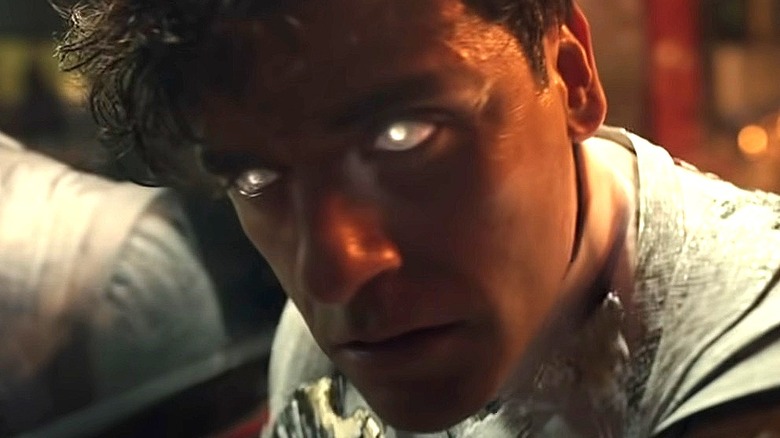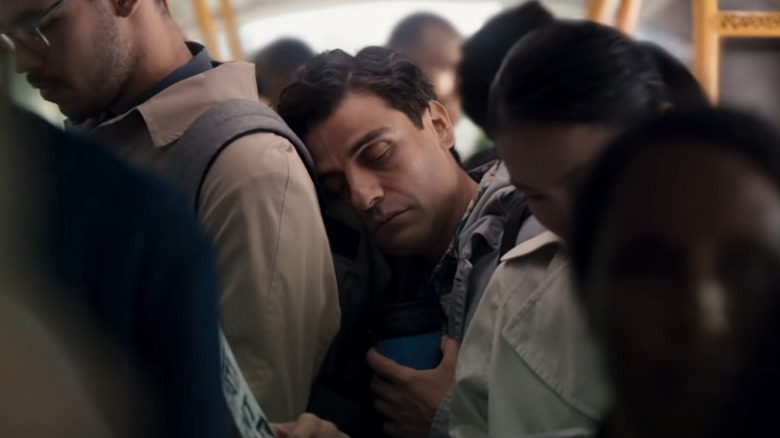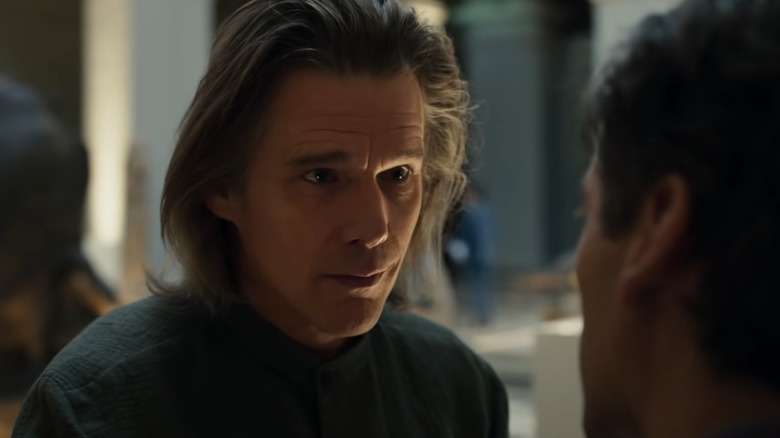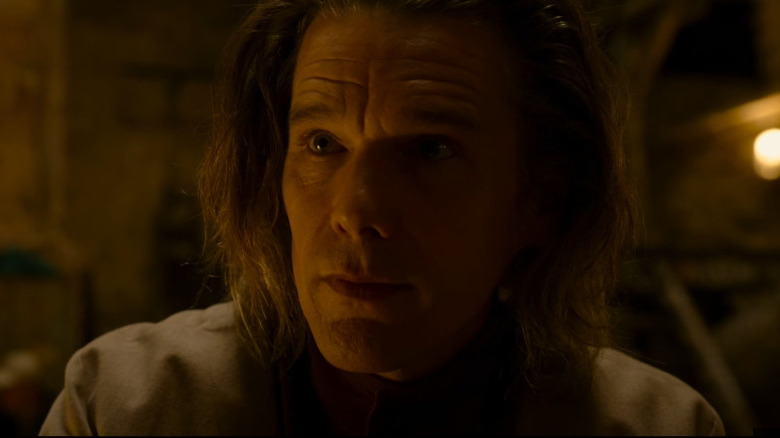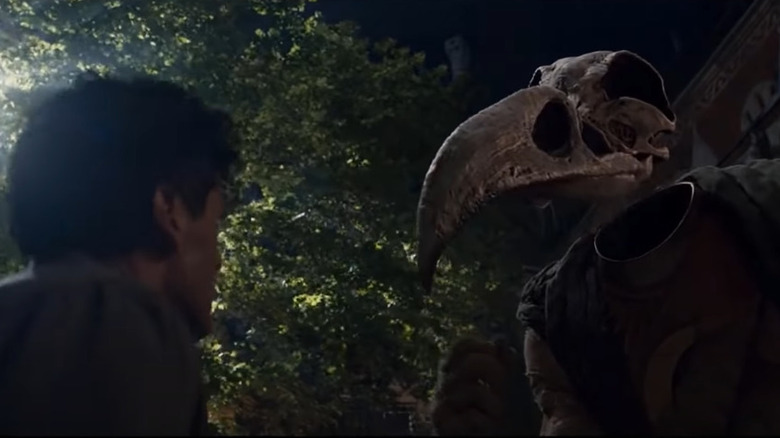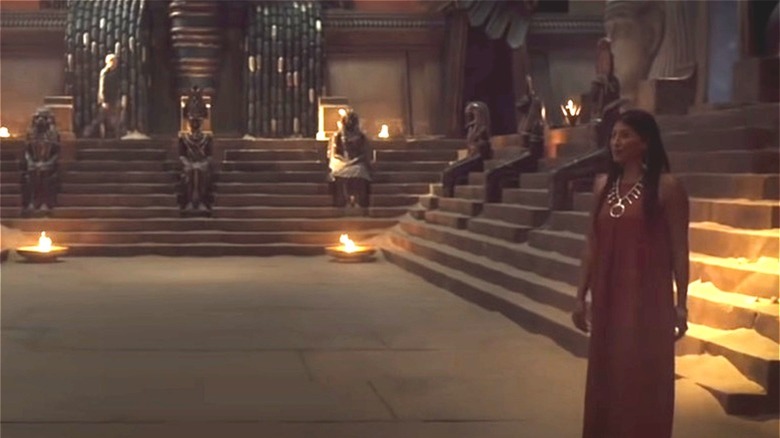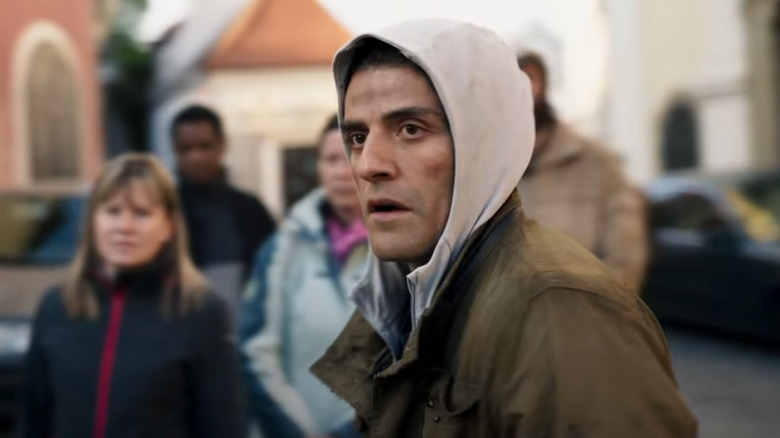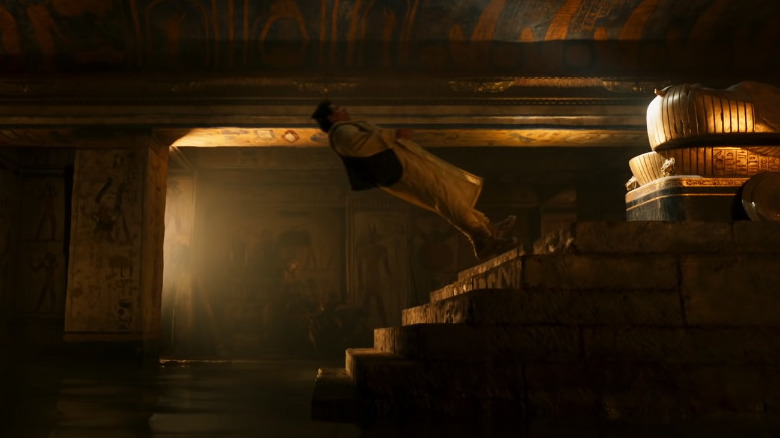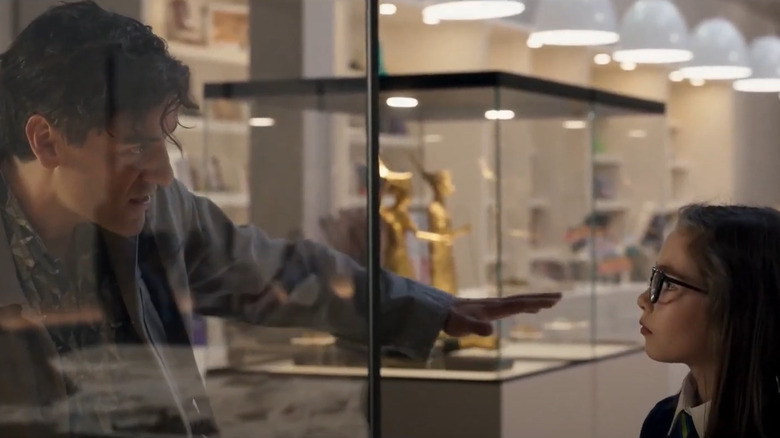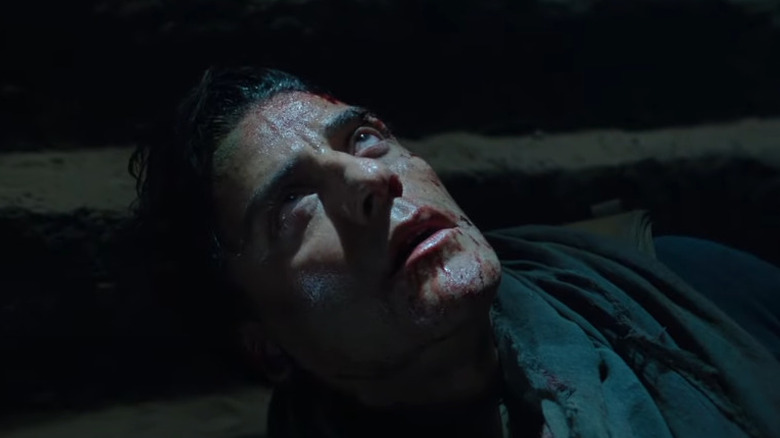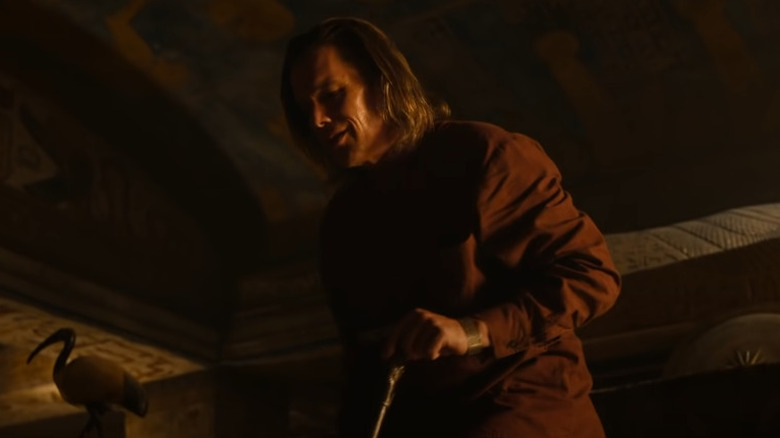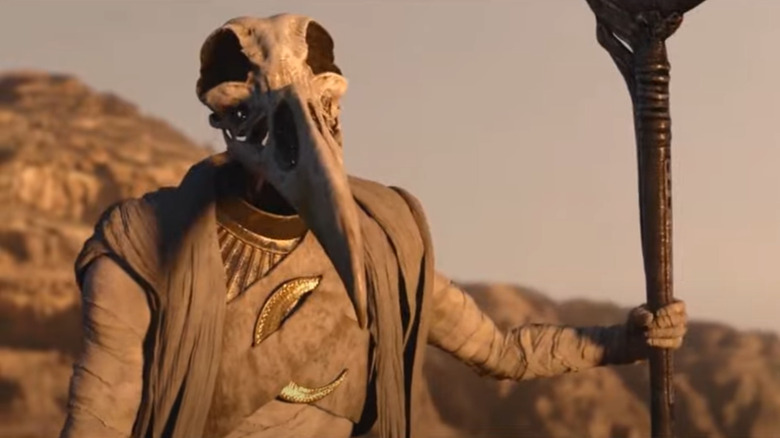Lines In Moon Knight That Mean More Than You Realized
Marvel's "Moon Knight" was warmly received by both critics and fans, who praised it for taking a novel approach to superhero storytelling while still being firmly set in — albeit not heavily reliant on — the Marvel Cinematic Universe. The show has "a freshness to it that's enticing even for those outside the fandom," said Variety, while Empire described it as "a boldly bonkers affair that manages to capture the same giddy joy imbued in 'Hawkeye' and 'Loki.'"
One of the underlying themes of "Moon Knight" is that things aren't always what they seem, whether it's the internal tug-of-war between Steven Grant and Marc Spector, the true intentions of certain characters, or the many questions surrounding Spector's activities prior to becoming Moon Knight. The writers provide just enough answers in each episode while still leaving the audience with more questions. Sometimes, even lines of dialogue have secrets of their own — hidden meanings that are only revealed when you examine them in hindsight.
Here are some lines from "Moon Knight" that mean more than you may have initially realized. Spoilers ahead.
Still wake up every morning feeling like I got hit by a bus
We've all been guilty of playfully exaggerating the amount of pain and exhaustion we feel at a given point, especially when we're talking to people close to us. That's why when Steven Grant (Oscar Isaac) utters this line during a supposed telephone conversation with his mother in the opening scene of Episode 1, it doesn't sound particularly remarkable or out of place. After all, when you tell someone that you feel like you got "hit by a bus," you don't really mean that in the literal sense.
However, this line is actually a verbal clue that "Moon Knight" offers viewers, a hint that things are far from okay in Steven's life. At this point, Steven has no idea about the adventures of Marc Spector, the other personality living inside his body. Nor is he aware that Marc takes control of their shared body and often gets into very hairy situations while fulfilling his duties to Khonshu (F. Murray Abraham). This, of course, is why Steven wakes up with mysterious injuries that he doesn't remember sustaining, and occasionally even "sleeps in" for days at a time.
Interestingly, Steven does end up getting hit by a car during his battle with the invisible jackal summoned by Arthur Harrow (Ethan Hawke). He then props himself up against a bus, speaking to Marc in his reflection and handing over control of the body to continue the fight.
It's maddening, isn't it? The voice in your head
In the first episode of "Moon Knight," Harrow tracks Steven down to his workplace, the National Art Gallery in London. He tries to reclaim the golden scarab that the clueless gift shop worker took from Harrow's men while operating as Marc. When Harrow confronts Steven and asks for the scarab back, he attempts to establish some common ground with his terrified target by hinting that he's aware of the demanding presence whispering commands inside Steven's mind. "It's maddening, isn't it? The voice in your head. Relentless. Forever... unsatisfied."
At this point, Harrow has no idea that a separate persona exists inside Steven's body, and neither does Steven — he only really gets to meet Marc for the first time at the end of this episode. Still, it's a weirdly prophetic line from Harrow that ends up meaning more than he originally intended. After all, most of the interactions between Steven and Marc after the latter's formal introduction in the series involve one trying to permanently wrestle away control of their shared body from the other.
Sometimes the cure is a little taste of the disease
After Steven meets Marc's wife Layla El-Faouly (May Calamawy) and gets fired from his job at the museum, two of Harrow's minions pose as police officers and trick Steven into accompanying them to their base of operations. There, Harrow tries to get Steven to stop listening to Khonshu while showing him the small village where his followers live in apparent bliss. Harrow even has a civilized dinner conversation with Steven, serving him vegan dishes while talking about his time as Khonshu's avatar. During their talk, the cracks in Harrow's logic and morality begin to show. Before long, he starts discussing the idea of preemptive justice — Ammit, the goddess he now serves, is all about taking preventive measures to stop would-be criminals in their tracks before they can even think of committing crimes.
When Steven expresses disgust at the idea of murdering innocents who haven't done anything wrong yet, Harrow's chilling response implies that for the greater good, drastic actions must sometimes be taken: "Sometimes the cure is a little taste of the disease." Two episodes later, the "cure" does turn out to be "a little taste of the disease" for a depowered Marc when Harrow shoots him point-blank in Alexander the Great's tomb. Marc looks like a goner for a moment, but he wakes up in what appears to be a mental facility — a hallucination that helps him return to the land of the living with renewed focus.
You think you own this body? It belongs to me
The show's second episode features an action-packed battle between Harrow's jackal minion and Marc/Steven as Moon Knight/Mr. Knight. In the resulting chaos, Marc loses the scarab, which ends up in Harrow's possession. This leads to a conversation with Khonshu, in which the Egyptian moon god reminds Marc that, among other things, he owns the mercenary's body. While this may seem like just another attempt at displaying dominance in a conversation peppered with threats and insults, this line actually hints at a deeper connection between Marc/Steven and Khonshu.
It's worth noting that the first two episodes of "Moon Knight" don't reveal the exact circumstances that led to Marc working for Khonshu. However, fans of the "Moon Knight" comics know the story well: Left for dead in front of a statue of the Egyptian god, Marc established a connection with Khonshu, who rejuvenated him and gave him a host of powers as his new avatar. Their partnership also involves Khonshu claiming ownership of Marc's body — he isn't above casually reminding Marc of this fact by killing him and immediately bringing him back to life whenever he feels like it.
It was not so long ago Khonshu enjoyed Hathor's melodies
When an energetic chase in Egypt ultimately leads to a dead end, Khonshu comes up with an idea (which he admits is "a bad one") to stop Harrow from achieving his goal of resurrecting Ammit. Using his powers, he messes with the daytime sky, sending a signal to the rest of the Egyptian gods (or the Ennead) to call a meeting. Having decided to refrain from messing in human affairs, the gods are furious with Khonshu. The moon god used to be part of the council himself until he blew their cover — it was a similar action that prompted his banishment in the first place.
Moments before the Ennead begins their session, Marc gets the chance to talk to Hathor's avatar, Yatzil (Díana Bermudez). She casually mentions how, in the not-so-distant past, Marc's deity "enjoyed" the songs of the goddess of love, music, and pleasure: "It was not so long ago Khonshu enjoyed Hathor's melodies." The line implies that the two gods were once lovers as well as council colleagues.
I have no idea how many personalities he must possess
In the third episode, when the Ennead summons Harrow to defend himself against the charges that Marc and Khonshu put forward against him, he immediately resorts to discrediting both the deity and his avatar. Speaking of his experience as Khonshu's former mortal representative, Harrow describes his time under the moon god as anything but pleasant, and even hints that it has left lasting damage on his person. He successfully destroys Marc's credibility by highlighting his mental state, convincing the council that Marc is ill, unstable, and easily manipulated. He even throws in a casual jab: "I have no idea how many personalities he must possess."
Examining that seemingly throwaway line in another way, there's actually more substance to it than Harrow (or the audience) may realize. After all, while viewers and most of the major players in the series are aware of the Steven/Marc duality, there are hints throughout — from Steven, an avowed vegan, scheduling a steak dinner date to Marc blacking out and waking up surrounded by dead bodies — that there may actually be another personality hiding inside Steven/Marc's body. In the mental facility, when Marc frees Steven from a sarcophagus and they make a run for it, they pass by a second sarcophagus, which they ignore. Fans of the "Moon Knight" comics know what this implies: The existence of the Jake Lockley personality.
I can't help you if you can't help yourself
In Episode 4, Harrow confronts Marc in Alexander the Great's tomb, an encounter that ends with Harrow seemingly killing Marc with a gun. Marc falls into the water, then wakes up dressed as a patient in a mental facility, heavily tranquilized and unable to stand up from his wheelchair. In this bizarre, twisted reality, Harrow appears as Marc's well-meaning doctor, telling him he's there for his own good. Harrow also tells Marc that he can only get the help he needs after he begins helping himself. While this may sound like nothing more than a run-of-the-mill self-help line, there's actually more to it than that, when viewed in the proper context.
In the previous episode, Khonshu was imprisoned by the Egyptian gods in a tiny statue after he and Mr. Knight turned back the night sky by thousands of years in order to use a star map to find Ammit's tomb. This leaves Marc/Steven with no access to any of Khonshu's powers or his battle suit. Left to their own devices, Marc and Steven have no choice but to soldier on without the deity's protection. In other words, until he frees Khonshu, Marc cannot rely on the god's help to get him out of sticky situations and must instead survive with his own wits, skills, and resourcefulness. He has to help himself.
And did it suck for you? Getting rejected from the Field of Reeds?
In Episode 5, the hippopotamus-headed goddess Taweret (Antonia Salib) acts as a guide for Marc and Steven as they traverse the sandy expanse of the Duat and head toward paradise, the Field of Reeds. The Egyptian deity also gives them a time-sensitive mission: They must balance the Scales of Justice before reaching their destination, or they won't be allowed to pass through the gates. Marc and Steven go on a journey through the former's early life in which he reveals the truth about his childhood and his created persona. However, this isn't enough to grant them safe passage, and as the dead trapped in the Duat move to claim Marc and make him one of them, Steven steps in to save him.
While shocking, Steven's heroic sacrifice in the Duat was actually hinted at way back in Episode 1. When Steven arrives at the National Art Gallery to fulfill his day-to-day duties at the gift shop counter, he accompanies a little girl as her impromptu tour guide, using his knowledge of Egyptian lore to keep her occupied. In a discussion about how ancient Egyptians handled their dead, Steven mentions the Field of Reeds, to which she asks if it sucked for him to get rejected from paradise. Steven thinks it's an odd question, since he isn't dead — ironic, given what eventually happens to him.
That sneaky old vulture, he was manipulating you from the start
In Episode 5, Marc and Steven go on a painful (mainly for Marc) trip down memory lane. Among other details about Marc's past, Steven finally learns the truth about how the mercenary began working with Khonshu. It turns out that Marc didn't have much of a choice. After being betrayed by his employer, he crawled to the Egyptian god's statue inside an ancient structure and nearly died at the idol's feet. Suddenly, Khonshu spoke to Marc directly and offered him a deal: If Marc would agree to become the Fist of Khonshu, his Moon Knight, then he would be spared from certain death. This causes Steven to blurt out, "That sneaky old vulture, he was manipulating you from the start." It's an interesting line, particularly for comic book readers.
Moon Knight's origin story has been retconned a few times, but in at least one case, it's hinted that Khonshu had a hand in the events that shaped Marc growing up. In other words, he may have actually been grooming Marc to be his avatar even way before Marc was formally aware of Khonshu's existence. And because of the post-credits revelation that Marc actually has another personality (Jake Lockley) hidden in him, it really does make Khonshu look like a sinister puppeteer who's been lying to Marc from the start.
Sometimes, we need the cold light of death before we can see reality
Episode 6 sees Arthur Harrow seemingly triumphant, standing over the body of Marc Spector in the tomb of Alexander the Great. Arthur shot Marc point blank two episodes earlier, and was able to seize what he needed in order to fulfill his mission of bringing Ammit back to life. However, the self-righteous villain couldn't help but deliver a eulogy for Marc, leaving the golden scarab on his chest while saying the ominous line, "Sometimes, we need the cold light of death before we can see reality."
Of course, the fanatic Ammit supporter had no idea just how on-point his statement was. After all, it was his murder of Marc that not only helped the mercenary come to terms with his past, but also brought him closer to his alternate personality. Upon their return to the land of the living, Marc and Steven were even more powerful and skilled, and were able to properly harness the powers of Khonshu (with a little help from Layla, Taweret's newly minted avatar) to defeat both Arthur and Ammit.
I will release you both, you have my word
In the final episode of the first season of "Moon Knight," a freshly released Khonshu and a newly resurrected Marc/Steven have a discussion in the desert about how they can work together to thwart Arthur's plan of releasing Ammit. Steven (dressed in Mr. Knight garb) faces Khonshu and negotiates with him on their behalf: They'll work with him, but only if he promises to release them afterward. Khonshu is shocked that Steven would think of bargaining with the world in danger. Nevertheless, the Egyptian god concedes, giving Steven his word that he will release both of them. But, because this is Khonshu, the specific wording matters.
While Khonshu did promise to release Marc and Steven after they finish their mission, he didn't say anything about Jake Lockley. Throughout the season, the show dropped hints that Marc and Steven aren't the only personalities residing in the mercenary's body. In the post-credits stinger attached to Episode 6, the Jake Lockley persona is finally revealed. He abducts Arthur from a psychiatric ward, brings him face to face with Khonshu inside a white limousine, and then shoots the villain multiple times. Marc's most dangerous personality is now on the loose and doing Khonshu's bidding.
